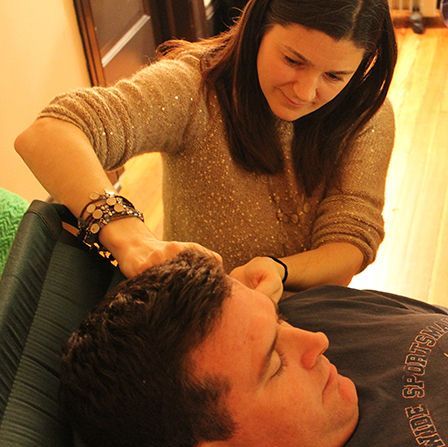How to Quiet Your Mind
My first introduction to meditation happened as part of my acupuncture training when I was required to take Tai Chi and Qi Gong classes (Chinese meditative movement techniques). Me being me, I decided to also start a yoga and meditation practice at the same time.
At first, I felt like such a failure because no matter how hard I tried, I just couldn’t quiet my mind. Oh, the thoughts, so many thoughts! Racing, incongruent, practical, nonsensical, judgmental, emotional, all over the place thoughts that just didn’t seem to quit.
Not only that, but they seemed to get worse the more I tried to stop them.
That’s why I spent the next twenty years of my life chasing down any technique I could find to help my mind and my body relax and here is what I learned. These three basic principles have helped me the most:
1. Why do thoughts race?
Turns out there are lots of different reasons for racing thoughts. Here are some of the most common.
- First, let’s talk about the obvious- chemistry.
Many people rely on stimulants to get them through the day. No judgments, there is a ton of pressure on us to perform and produce and accomplish way more than is humanly possible in a day. Certain chemicals stimulate our nervous system, and excessive or racing thoughts are part of that stimulation.
Caffeine, sugar, adrenaline, and even harder substances like cocaine and methamphetamines, all interact with our brain chemistry and cause racing thoughts.
Sometimes the degree of racing can be affected by changing the amount of chemicals, for example one cup of coffee a day instead of three. Or black tea instead of coffee, because it has less caffeine. Or by stopping altogether. (Be ready for the withdrawal symptoms and give yourself at least a week, if not four weeks, to feel like yourself again.)
(Also related to chemistry are nutritional imbalances and disturbances in the microorganisms of our gut. In these cases, analysis and guidance from a nutritionist and a doctor can be extremely helpful, but these methods are time consuming and require a sizeable investment of money for both testing and supplementation.)
- Over-scheduling can cause racing thoughts
When there are a lot of things to remember, whether it’s work related, or family schedules, or personal projects, minds can get busy trying to stay organized. And again, let’s face it, many of us are over-scheduled these days just by nature of the society in which we live. We are expected to take care of more and more as the years go by.
Consider letting go of some projects, asking for help from others, or just prioritizing what you want and need to focus on, verses what you think you should be doing. I know for me, that feeling of trying to force my family (home, kids, myself, etc.) to be like other people has caused me no end of heartache. Accepting who we are and what’s important to us helps me determine, “how important is it?” when it comes to the things I do.
- Sometimes our thoughts race out of habit
Sometimes this happens because we haven’t trained them to do anything else. Without guidance and practice on how to live with a quiet mind, our brains get busy by default.
Starting a meditation practice, or learning about mindfulness, can help train your brain to quiet down. The more you get used to a quiet mind, the easier it is to find your way back to it. Be patient though, habits take time to form, and new skills take time to master.
2. Quieting your mind isn’t about turning your mind off
I used to always think my mind had to be completely silent and completely empty for it to quiet down. Turns out that’s not true! We don’t start by making the thoughts go away, that comes way later.
- The first step is to see thoughts as just thoughts, and nothing more
Some people call this the “observer self” but it’s really just this idea of becoming of aware of the thoughts as something separate from who we are. For example, when I think, “I have to go to the grocery store, but I have to leave by 2:30 so I have time to pick up the kids at 3:30.” Instead of continuing to follow that train to God knows where, I take a breath and acknowledge, “I just had that thought.”
By doing this, by interrupting the process of thinking and acknowledging that I can observe the thinking, I create some space between me and the thought. And that space is the start of a quiet mind.
- Next comes observing without judgment
For example, “I had a thought” verses “I can’t believe I would think such an awful, negative, stupid thing!” This is what can happen once there is some space between the thoughts. Quieting the qualifying of the thoughts (good, bad, stupid, smart) takes away the emotions that get mixed in, which makes the thoughts calmer and quieter and easier to work with, even if they are still very present.
3. It’s your heart that’s really in charge, not your head
Probably the most important thing I have learned over the years is the idea that when my thoughts are racing and my brain is at its busiest, it’s because my mind is trying to overcompensate.
- Our hearts lead and guide us
According to Chinese Medicine theory, our heart is considered our personal leader, our inner emperor or empress, that benevolently rules the kingdom of our body. Our hearts allow for the full range of our feelings and emotions and for us to process those sensations in each and every moment.
I don't know about you, but as a child I wasn't allowed to feel all my feelings and express all my emotions at any given moment. Even with my kids now, it's not always safe or appropriate to let it all out. This conditioning, that is necessary when living in a society of people, mistakenly taught me that the sensations in my body were dangerous and something that must be stopped.
So when I’m scared, or angry, or stressed, or even sometimes when I’m super uncomfortable with my own joy, my mind will hop online as a defense mechanism to keep me from feeling. “If my thoughts are really busy, I won’t have to deal with this emotion, this heart ache, this intimacy, this pleasure.” Whatever the sensations may be.
- This is not a conscious decision
It’s an old habit. But when I can remember that no matter how hard my brain tries to control my situation (every single aspect of it) in order to keep me from feeling and from getting hurt, that’s not its job. My mind is incapable of making sense of things like death, and love, and belonging. But my heart can. That’s actually its job, to orchestrate the love and understanding of me and my experiences in this lifetime. And it does that through feelings and emotions.
- our brains just help with logistics
My brain helps me: pick up the phone and ask for help, facilitate the movement required to take a deep breath, or get out the pen and paper so I can write, or draw, or color. When my brain follows my heart, it can relax because that’s what it is meant to do.
There is obviously no one way to quiet a busy mind, and the truth is that change takes time. But knowing what you’re working with when it comes to your thoughts can be extremely helpful.
I hope that you can apply at least one of these principles to your life in a way that makes a difference. I know for me it’s been a long road, but the more I practice quieting and calming my mind, the easier it gets, and the more fulfilled I feel.
For now, take a deep breath and know that you are exactly where you need to be in your practice. Every journey starts with one step, as they say. I believe in you! You can do it!
share this
LOOKING FOR MORE?
Related STORIES

Never miss a story
get Andrea's latest
Sign up for our email list and receive weekly stories from Andrea and a heads up on upcoming events.
Contact Us





